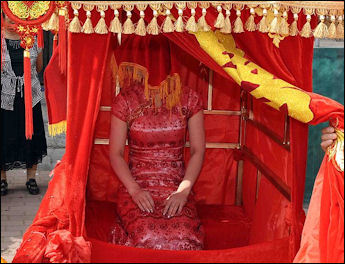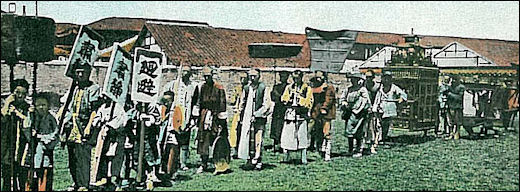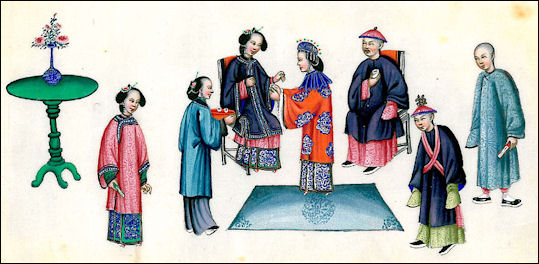NAKED MARRIAGE IN CHINA

Expensive wedding Weddings done on the cheap are known as “naked marriages” in China. One young woman told the China Daily that her wedding day consisted of taking the day off from work to register their marriage and having dinner afterwards to celebrate. Instead of lavish banquet they had a $15 dinner at the restaurant where they first met. She said they had no time for wedding pictures as they had to go to work the next day. The woman said, “I’m a naked-marriage lady in the true sense — I didn’t even take wedding leave.”
An Internet posting sited in the China Daily on naked marriage went: “No apartment, no car, nor diamond ring; no wedding ceremony, no honeymoon; each of pay 4.50 yuan [66 cents] and we get a wedding certificate to start a new life.”
There are two kinds of naked marriages according to the China Daily: the total; and the half-naked marriage in which the guy gives the girl a ring or something else of value. The trend is becoming more commonplace as high real estate costs make owning an apartment an unreachable dream and the money coules have is needed for scraping by day by day. One woman who at least wanted a ring told the China Daily, “I’ll doubt a man’s sincerity if he asks for a girl’s hand in marriage without a ring or a wedding ceremony. If he really wanted too marry her, he should have gotten ready for this: saving money is not an excuse.”
Wang Zhiguo of Baihe.com, China’s largest matchmaking site, told the China Daily: naked marriage “teaches young people the core spirit of marriage — love each other deeply, no matter rich or poor — and emphasizes saving money for other important things like travel and their children’s education. He added though that there was an inherent instability to the custom: “If we see marriage as a contract — which includes three items: love, responsibility and a material base — any missing link will lead to some problems in the relationship between husband and wife.”
Ninety percent of all unmarried people between 28 and 49 are male. Many are stigmatized as “bare branches that don’t bear fruit.” According to an article in the Global Times, China’s National Population and Family Planning Commission has found that problems such as forced prostitution, abductions and trafficking of women and childrest are highest in places where the sex ratio is skewed against men. The shortage of men in China due to sex-selected abortions and other reasons theoretically makes it easier for women to be choosy and requires men to work harder. Chen Kiaomin, director of the Women’s Studies Center at the Shanghai University of Political Science and Law told the Times, “In the past people were introduced by relatives, or if they dated a date meant going to a park, Now you have to spend money in restaurants and cafes.” In the richer coastal areas men look to the poorer west for brides. Brides are also sought in poorer neighboring countries like Myanmar, North Korea, Vietnam and even Russia.
See Separate Articles: LOVE IN CHINA factsanddetails.com ; MARRIAGE IN CHINA factsanddetails.com ; GHOST MARRIAGES IN CHINA factsanddetails.com ; ARRANGED MARRIAGES AND MATCHMAKERS factsanddetails.com ; DATING IN CHINA factsanddetails.com ; LOVE HUNTERS AND HIGH-END DATING SERVICES IN CHINA factsanddetails.com ; WEDDINGS IN CHINA: MONEY, RULES AND LACK OF A CEREMONY factsanddetails.com ; TRADITIONAL CHINESE WEDDINGS factsanddetails.com ; WEDDINGS CUSTOMS IN CHINA: PHOTOS, THE BANQUET AND GIFTS factsanddetails.com ; CONCUBINES AND MISTRESSES IN CHINA factsanddetails.com ; DIVORCE IN CHINA factsanddetails.com ; DIVORCE LAWS IN CHINA factsanddetails.com ; BRIDE SHORTAGE AND UNMARRIED MEN IN CHINA factsanddetails.com ; FOREIGN BRIDES IN CHINA factsanddetails.com
Websites and Sources: Marriage: Wikipedia article Wikipedia ; Chinatown ConnectionChinatown Connection ; Travel China Guide travelchinaguide.com ; Agate Travel warriortours.com : Dating Chinatown Connection Chinatown Connection
RECOMMENDED BOOKS: “Chinese Marriages in Transition: From Patriarchy to New Familism (Politics of Marriage and Gender (2023) by Xiaoling Shu and Jingjing Chen Amazon.com; “Marriage and Inequality in Chinese Society” by Rubie S. Watson and Patricia Buckley Ebrey Amazon.com; “My Chinese Marriage” by Mae M. Franking and Katherine Anne Porter Amazon.com; “Marriage and Family in Modern China (The Library of Couple and Family Psychoanalysis) by David E. Scharff Amazon.com; “The Ugly Wife Is a Treasure at Home: True Stories of Love and Marriage in Communist China” by Melissa Margaret Schneider Amazon.com; Our Story: A Memoir of Love and Life in China by Rao Pingru and Nicky Harman Amazon.com; “Handbook on the Family and Marriage in China (Handbooks of Research on Contemporary China series) by Xiaowei Zang, Lucy X. Zhao Amazon.com; “Wives, Husbands, and Lovers: Marriage and Sexuality in Hong Kong, Taiwan, and Urban China” by Deborah S. Davis and Sara L. Friedman Amazon.com; “Migration and Marriage in Asian Contexts” by Zheng Mu and Wei-Jun Jean Yeung Amazon.com; “The Missing Girls and Women of China, Hong Kong and Taiwan: A Sociological Study of Infanticide, Forced Prostitution, Political Imprisonment, "Ghost Brides," Runaways and Thrownaways, 1900-2000s” by Hua-Lun Huang Amazon.com; “Seeking Western Men: Email-Order Brides under China's Global Rise” by Monica Liu Amazon.com
Older Women, Dating and Marriage in China

In a survey of 32,000 people in 2010 by the All-China Women’s Federation 90 percent of men said that a woman should get married before the age of 27. Those that don’t risk being called sheng nu — “leftover ladies.” [Source: Bloomberg News, May 31, 2012]
Bloomberg reported: “Higher learning breeds higher expectations, and the group of well-educated, older, unmarried women has swelled in the last two years, Zhou said. The number of single Shanghai women in their late 20s tripled in the last 15 years, to almost one in three, according to the Brookings-Tsinghua Center for Public Policy. Nearly 40 percent of college-educated women between 25 and 34 in the city were unmarried in 2005, the center said. That’s compared with 6 percent for women with only junior-school education.
While some women look to marry later, social expectations for a younger bride remain. A survey by Jiayuan.com in Shanghai this year categorized women over 29 as “leftovers.” “Women can be very picky when they’re young,” said Huang. “But if you don’t sell when it commands the highest value, you may miss the golden opportunity. There are so many women for us men to choose from. We really have no reason to pick a 28-year- old when you can find a 26-year-old.”
Pre-Nuptial Agreements and Snail Marriages in China
The first prenuptial agreements have appeared in China in recent years. Some of them have some pretty strict terms. According to the China Daily one read: “If the husband has an extramarital affair, he has to pay 200,000 yuan [$29,300] to the wife.” It also said, “If the husband’s mobile phone is not in service, he should report to the wife immediately and apologize; if the husband does not come home one night, he should pay 1,000 yuan to the wife; in case of a quarrel, the husband should always be the one to apologize.” Needless to say the groom-to-be didn’t sign it and called off the wedding. [Source: Gan Tian, China Daily, June 2010]
The first prenuptial agreements appeared in 1990 according to the Chinese Ministry of Civil Affairs. Most of the prenuptial agreements in China are drown up women. One that was accepted called for the husband to turn everything her earned, about $3000 a month, to his wife, who in turn would give a $775 a month allowance to her husband. It also said the husband was responsible for washing dishes and ironing clothes while the wife was in charge of cooking and keeping the house clean. The woman who drew up the agreement told the China Daily, “It can avoid trouble after marriage. Besides, the couple will love each more, as they know what their duties are.”
"Wo- hun" literally translating to ‘snail marriage.” This word refers to young couples that divorce but remain living together for financial reasons. Statistics estimate that the divorce rate among the 80s generation (80) is around 30 percent. While this number has increased, so too has the price of houses, deterring divorced partners from physically going their separate ways after they’ve figuratively done so. The phenomenon is a product of pressure on couples to get married and buy a house so that they can leave the confines of their parents. Most of these young guys and gals tied the knot right after college and received the support of both families to finance a home of their own. When newlywed turns into newlyshed, some prefer to stick it out side by side, like two snails in one shell, rather than confront the hassle of sorting out new accommodation.
Young Men Need a House to Get Married

Jino minority dance David Pierson wrote in the Los Angeles Times: “Many women won't marry a man who doesn't own a home. This recent shift, along with soaring real estate prices, has created a woefully frustrated class of bachelors... Mike Zhang considered himself serious boyfriend material. He knew what to order at an Italian restaurant. He could mix a tasty margarita. And he always volunteered to carry his girlfriend's handbag.Then came the deal breaker. Zhang, a 28-year-old language tutor and interpreter, couldn't afford an apartment in the capital's scorching property market. Rather than waste any more time, his girlfriend of more than two years dumped him. [Source: David Pierson, Los Angeles Times, June 21, 2010]
“Zhang's misfortune is not uncommon. China's housing boom has created a woefully frustrated class of bachelors. Home prices in major cities including Beijing and Shanghai have easily doubled over the last year as families and investors rush to grab a piece of the Chinese dream. A typical 1,000-square-foot, two-bedroom, one-bath apartment in the capital now costs about $274,000. That's 22 times the average annual income of a Beijing resident.” Unlike in the United States, where home buying traditionally takes place after marriage, owning a place in China has recently become a prerequisite for tying the knot. Experts said securing an apartment in this market signals that a man is successful, family-oriented and able to weather challenging financial circumstances. Put succinctly, homeownership has become the ultimate symbol of virility in today's China.” "A man is not a man if he doesn't own a house," Chen Xiaomin, director of the Women's Studies Center at the Shanghai University of Political Science and Law, told the Los Angeles Times. "Marriage is becoming more and more materialistic. This is a huge change in Chinese society. No matter how confident a woman is, she will lose face if her boyfriend or husband doesn't have a house."
Marriage Market Survey in China — a survey of 32,000 people in 2010 by the All-China Women’s Federation — revealed that 70 percent of single woman would not consider marrying a man unless he already possessed a home. Roseann Lake wrote in Foreign Policy: “It is culturally approved — even expected — for a woman to "free-ride" and move into her husband's house without making any contributions to it, but given the astronomical cost of housing, more women are helping to cover costs too. Doctoral research by Leta Hong Fincher of Tsinghua University focuses on Chinese women who are pitching in, if not shouldering, the joint purchase of a home with their husbands. She points out that this may work to their disadvantage down the road. Due to traditional, yet increasingly improbable, ideals of the man as the sole provider, homes are generally registered under a man's name. According to Chinese law, property belongs only to the person whose name it is registered under, so in the event of a divorce, women who are not listed as co-owners will lose out on financial contributions to their former marital home. Fincher also cites instances in which young women are hassled by parents into transferring their life's savings to a bachelor relative, so he can use the money to buy a house and increase his chances of finding a wife. Because it is assumed that a woman will marry into a house, the logic goes that she has a less pressing need for savings of her own. [Source: Roseann Lake, Foreign Policy, September 28, 2012]
On the other hand, women who are homeowners before marriage are considered better off, and this can actually improve their chances of "marrying up" into the echelons of moneyed men who have bigger houses than they do. Jeannie Wang, 29, of Beijing, is one of those women. Well-employed at a major auditing firm, she purchased an apartment as an investment and plans to live at home with her parents until marriage. "Ideally, I would like a man to also have a house of his own, or at least the earning potential so that we can buy one together," she says, slightly concerned that having a man move into her house would humiliate him. "I wouldn't mind so much if I really cared for him, but it's something I think few Chinese men would go for."
Her case illustrates the double-edged nature of female property ownership in China. Own something, and it might allow you to marry someone with something bigger. Own something too big, and it could intimidate potential suitors. For men, however, bigger is always better. Zhang recalls visiting villages in China that were bedizened with a "phantom third story." This type of construction refers to a two-story house with an unfurnished, unfinished third story built to make the house appear more grandiose from the outside. The trend has taken off in neighborhoods where the competition for a wife is particularly fierce; in some areas, it has become mainstream to the extent that matchmakers won't schedule an appointment with a man's family unless his house has the requisite phantom floor.
Wei and Zhang estimate that the pressure to accumulate wealth for marriage is responsible for 20 percent of the growth of the Chinese economy, as men scramble to start businesses and secure high-paying jobs in order to keep up with expenses. The word fangnu is an example of their struggle. Literally translated, it means "a slave to the home" and refers not to a woman who is a slave to housework, but in most cases, to a man who must slave at his job in order to afford a house and, by extension, a wife.
Trouble Getting a House in China in a Booming Economy

“Material matters weren't quite so important when previous generations courted. Most Chinese were poor. Property was controlled by the state and homes were doled out through an individual's work unit,” David Pierson wrote in the Los Angeles Times. “When China was more agrarian, marriages were usually arranged, and it was customary for a bride's family to provide a dowry — be it money, bedding or even a sewing machine.” But economic reform and mass urbanization in the last 30 years have upended these norms. In 1998, the central government launched one of the largest transfers of wealth in human history by allowing Chinese to buy their homes from the state, often with subsidies. The privatization of property spurred the creation of a commercialized housing industry with developers and investors.” Young Chinese are coming of age at a time of exploding wealth and rising expectations for material success. In a survey last year on Sohu.com, a popular Web portal similar to Yahoo, 73 percent of respondents said homeownership was a necessity for marriage. An almost equal percentage said they had difficulty buying an apartment.” [Source: David Pierson, Los Angeles Times, June 21, 2010]
Roseann Lake wrote in Foreign Policy: “When Xiaobo Zhang got married in the early 1990s, he and his bride, like millions of other couples across China, were given a small room to live in by his danwei, or work unit. At the time a lecturer at Nankai University in Tianjin, Zhang's room was utilitarian and unremarkable, virtually indistinguishable from the ones inhabited by his colleagues. In a word: average. [Source: Roseann Lake, Foreign Policy, September 28, 2012]
In the China of the 1990s, which was characterized by a pubescent limbo between the economic reforms of the 1980s and the last decade's explosive growth, Zhang recalls that mostly everyone was average. People were neatly packed into work units, generally laboring under the same conditions, eating in the same canteens, and sleeping in the same blocks of industrial-looking housing provided by their employers. There was little disparity in salaries, and few cars and luxury handbags to spend those salaries on.
During these times, Zhang explained, occupants paid minimal rent for their work-unit housing — which was issued based on seniority, family size, and rank — and could essentially stay in it forever. There was no legal market for buying and selling property in China, even in rural areas without employer-provided housing, where families built their own homes.
Then, in 1998, the Chinese real estate market was born. It began with a decision by the Chinese State Council to monetize housing in an attempt to develop a commercial private market for real estate. In other words, instead of just providing apartments for lifetime occupancy, companies, nonprofit organizations, and government agencies began to give their employees the option to purchase the housing they lived in. Fourteen years and a serious housing construction boom later, China's property market has allowed for one of the world's largest accumulations of real estate wealth in history, valued at $17 trillion in mid-2010 by HSBC Global Research and worth some 3.27 times China's GDP. (To better understand the scope of the construction boom that precipitated this massive accumulation of wealth, it's worth noting that between 1998 and 2008 alone, 14.4 billion square meters of residential housing space were constructed in China, according to China Statistical Yearbook figures. That's equivalent to 160 times all the residential space on the entire island of Manhattan.)
This is where the definition of "average" in China starts to go a little wonky. As a result of the real estate boom, reports in Chinese media indicate that the average property in a top-tier Chinese city now costs between 15 and 20 times the average annual salary, though J.P. Morgan reports indicate something closer to 13. (For purposes of comparison, in most of the world's cities, the housing-cost-to-income ratio hovers between 3-to-1 and 6-to-1, rounding out at about 3-to-1. This is especially problematic in China, where thanks to still-prevalent Confucian ideals of the male as the "provider," home ownership has become an unspoken prerequisite to marriage.
Young Chinese Men Dealing with the Problem of Trying to Get a House
"Not everyone has rich parents who can help you buy an apartment," Chen Kechun, a 25-year-old Beijing native told the Los Angeles Times. His relationship disintegrated after his six-month search for an affordable home proved fruitless. "I learned that if a girl decides to marry you, you better have a strong financial foundation,” he said. [Source: David Pierson, Los Angeles Times, June 21, 2010]
“Fang Jing is trying to hold on to his relationship,” Pierson wrote. “The 29-year-old has been trying to persuade his girlfriend to share in the $250,000 cost of a Shanghai apartment so that they can wed next year.” "She didn't agree immediately. She's still hoping I can take care of it myself," Fang said. "But we have to face reality. In Shanghai it's difficult for one person to afford an apartment. When we face something as important as this, men and women have to be equal." Fang will need about $75,000 to afford the 30 percent down payment on the home the couple want. That's a lofty goal, considering that the computer technician is between jobs and has no savings. He's counting on both sets of parents to chip in.
Wang Haijun, a real estate agent on Beijing's east side, said he can always tell when a desperate bachelor walks into his office. "They're always the least rational buyers," Wang said. "They don't care how little money they have. They just want an apartment as soon as possible. They take on a mortgage with the longest terms and highest interest rates. But they have no choice. They have to get married. I feel sorry for them."

Wedding Procession 1908
“Zhang, the language tutor and interpreter, wanted to marry his girlfriend, a receptionist at a language school,” Pierson wrote. “The two shared a love for American TV — "Sex and the City" for her and "Lost" for him. The closer they grew, the more she asked about their future and a home.” "I told her I loved her and would marry her if she didn't mind not having a house," Zhang said. "But she said no. I told her I wanted a house too, but I didn't know how. I'm not rich."
Zhang began checking real estate listings in his neighborhood a year and a half ago. He was stunned. An apartment of about 1,000 square feet cost $150,000. Zhang's parents, who run a modest bakery in northeast China, offered to help. But the $30,000 down payment was still well out of reach. His girlfriend grew increasingly concerned. She wanted to get married while her grandparents were still healthy and could celebrate her wedding. Last December, she called off the relationship.
Zhang took some time to get over the breakup. “He acknowledges he must begin saving money for an apartment, but he resents being judged by his inability to purchase property. He would rather have a woman love him for his charm than for the roof he puts over her head.” "People's values have changed," he said. "It doesn't matter if you're a nice guy or you're fun or good natured or have a sense of humor. They don't care. All they care about is a house."
Popular Culture, Materialism and Marriage in China
Dating websites are filled with stipulations for a house, and often a car too. "I'm 25 years old, looking for a boyfriend.... I want you to have an apartment and a car.... The apartment has to be built after 2000 and the car has to be better than a minivan," read one post on the popular Chinese Web portal Baidu. [Source: David Pierson, Los Angeles Times, June 21, 2010]
“Growing male frustrations have given rise to a new female archetype: the bai jin nu, or gold-digger,” Pierson wrote. “On the wildly popular TV reality program "Don't Bother Me Unless You're Serious," one woman tried to size up a suitor by asking matter-of-factly, "Do you have money?" The man cut to the chase: "I have three flats in Shanghai."...The hard-boiled bachelorette, Ma Nuo, has gone on to become one of China's most recognizable bai jin nu. Marry for love? Fat chance, said the material girl: "I would rather cry in a BMW than smile on the back of my boyfriend's bicycle."
“Ma's mercenary take on matrimony may be extreme; still, single women in China are driven by intense societal pressure to find a mate who can deliver the digs, ,” Pierson wrote. “Though more women are becoming career oriented, China remains stubbornly traditional. Males are expected to be breadwinners while females rear a family's only child.” "My parents think it's important.... They would rather I marry someone who owns his own property," said Wei Na, 28, an advertising saleswoman in Beijing. "It just makes you feel more safe if a man has his own place. I think most women feel the same way."
More Educated Chinese Women Seeking Foreign Husbands
Jason Ou wrote in the Straits Times, “More women in China looking for Mr Right in foreign countries are turning out to be well educated and well off. This year the number of marriages between Chinese women and foreigners reached a milestone, surpassing an estimated one million, according to China's media. That compares to just 14,193 transnational marriages in 1982, mostly between Chinese women and Caucasian men. Furthermore, one in two of these women now are believed to have at least college or university education. [Source: Jason Ou, Straits Times, November 15, 2011]
"In the late 1980s, many women, poor and uneducated, took transnational marriage as a way to change their destiny," said Yang Ling, a matchmaking agent in prosperous Jiangsu province. "But now many women who got hitched with foreigners are only children. They grew up in well-to-do families and even went to study overseas. The number of transnational marriages done for materialistic reasons has been dwindling.
About 1,000 women in Jiangsu, all aged below 40, registered their cross-cultural marriages in 2010. Up to 65 percent of them were degree holders, compared with less than 40 per cent in the 1990s, according to a provincial report on such marriages.
Mandy Li, manager of Lion City Marriage Agency in Singapore, agreed that "the landscape has changed", even though some people still have the misconception that most Chinese women who want to marry foreigners are poor and cash-hungry. Her agency has more than 600 female members aged between 25 and 45 from China, and is one of the few local agencies that specialize in matchmaking Chinese with Singaporeans. "Up to 50 percent of my female Chinese customers have higher education,' she said. 'They have white-collar jobs, such as teachers, assistant managers, and even biomedical researchers."
Four in five Chinese women are willing to tie the knot with foreigners if they fall in love with them, according to a Chinese online survey of 3,200 women this month. "If there is chemistry between us, I really don't care if he's a foreigner or not," said Wu Yuxing, 25, a Chinese who earned a master's degree at Singapore's Nanyang Technological University. Only 7 percent of those polled put a foreigner's bank account first in a relationship. The rest said they pay more attention to a man's character, lifestyle and career.
Why Educated Chinese Women Are Seeking Foreign Husbands
Jason Ou wrote in the Straits Times, ‘some educated Chinese women also say they find foreign men from developed countries often have better manners than men in China.Huang Minjie, 24, who is from a well-to-do family in southern China and was educated overseas, criticized some bad habits of men in China. "Many Chinese tend to smoke in public places, talk very loudly, and often jump the queue. Even those who receive university education or well-dressed people behave like that,' she said. 'I prefer some Europeans who are well mannered and chivalrous."[Source: Jason Ou, Straits Times, November 15, 2011]
Li said 'good manners' of Singaporean men were appealing to many Chinese women. "My customers believe most Singaporeans are polite and kind," she said. "They are not abusive and respect their partners." A love of foreign cultures, especially Western ones, also contributes to the decision of some women in China to marry foreigners. The manager of Guangzhou Romance Matchmaking Service in China, who wishes to be known only as Du, said that his agency has drawn in thousands of Chinese women seeking Caucasian spouses over the past seven years. "Our customers find the West fascinating. They admire the rule of law, high living standards, and Western cultures," he said. "For those members older than 30 or even divorced, Europeans or Americans are a good choice. Unlike Chinese, they usually don't care that much about their partners' age and past romance."'

An open letter dated three years ago written by a woman who claimed to be an wealthy undergraduate in Shanghai Jiao Tong University, is still widely circulating online today and hotly debated.In the letter, she slammed China as an unfair society and pledged to marry a Caucasian. "China has a lot of millionaires, but how many of them created their wealth by their dedication, wisdom and integrity? What's the good of living in this country? For toxic rice, tainted milk, or recycled cooking oil?" she wrote. "I could buy a villa in China, but how could I buy fresh air?... I just love the towns in the US, vineyards in France, and farms in Britain... I dream of marrying a Caucasian."
Today, many Chinese Internet users still criticize women married to foreigners for disgracing China and for what they call their blind faith in Western culture. "Many of these women regret only after living with foreigners for some time,' said one post on the Internet. 'They just ignore cultural differences at first, and their marriages are doomed."
Joking About Chinese International Marriage
Raymond Zhou wrote in the China Daily, “A Sina Weibo user who calls himself "Brother Cui in North America" wrote an assessment of foreigners marrying Chinese women. It spreads like wildfire partly because of its self-deprecating humor, which is not exactly a Chinese characteristic. Cui, verified by Sina as a Peking University graduate currently based in the US, seems to have set his eyes on a career similar to Joe Wong, the Chinese engineer who made his name with his Stateside standup comedy routines. So, Cui’s much reposted treatise on the hidden repercussions of transnational marriages should probably not be taken at face value. But like all humor or satire, it contains a kernel of truth — or in this case, a moment of epiphany to most Chinese. [Source: Raymond Zhou, China Daily, November 9, 2012 /*/]
“Cu's first word of caution to those interested in having a Chinese wife: "Once you marry a Chinese woman, you're marrying her whole family. In half a year, her mom and dad, her second elder sister and her children, will line up to come to America. A hundred years ago, first there was one Chinese worker who went to San Francisco to build a railroad, and now, lo and behold, California has a million Chinese. Which country in the future dares to invite Chinese to build their railroads?" /*/
“If an American politician had used this tone, the Chinese-American community would have jumped up in protest. In the US, ethnic humor is the territory of ethnic-minority comedians. Cui must have counted himself as one. But his jokes are actually designed for Chinese consumption, and as such, they display more accuracy and objectivity than previous descriptions of such marriages, which went to one of two extremes, either friction-free bliss or doomed failure. /*/
“Cui went on with his litany of backlashes, which include the dazzling array of Chinese kitchenware and Chinese sauces in an otherwise American home. OK, this sounds like a not-so-subtle approbation of the Chinese culinary art. But there is a definite downside, and that is the painful loss of privacy with the cohabiting in-laws. Your father-in-law may burst into the toilet you’re using and he may nonchalantly wash his hands and practice English with you, never finding it awkward, describes Cui. In Hollywood movies, the visit by an in-law is portrayed as a mini-apocalypse. So, if you get a Chinese spouse, you’re probably psychologically set for such a prospect — not just a brief visit, but an extended stay by your parents-in-law. /*/
“The language barrier is the most formidable one. Other than that, in my opinion, it is more a generational gap, with many of the quirks recited by Cui commonplace even inside China. For example, old folks tend to be frugal and turn off the light as they leave a room; they tend to see things like the carpet as a luxury item and insist on covering it up with a plastic sheet to prevent it from wear and tear.” /*/
Image Sources: 1) 1930s pictures, Night Revels, University of Washington; 2) Posters, Landsberger Posters http://www.iisg.nl/~landsberger/ ; Wiki Commons
Text Sources: New York Times, Washington Post, Los Angeles Times, Times of London, National Geographic, The New Yorker, Time, Newsweek, Reuters, AP, Lonely Planet Guides, Compton’s Encyclopedia and various books and other publications.
Last updated September 2021
